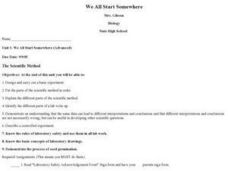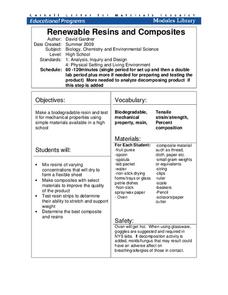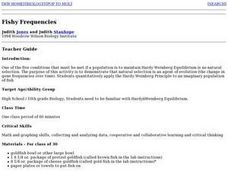Curated OER
Proteins Expressed At Different Stages
Young scholars investigate protein electrophoresis in a lab setting. Full laboratory equipment is needed and safety should be taught. The level of prior knowledge needed to perform lab is high and is ideal for an honors class.
Curated OER
How Clean are the Laboratory Tables?
Students participate in an experiment in which they test the cleanliness of the lab tables. They practice using different materials and analyze their results. They answer comprehension questions to end the lesson.
Curated OER
Norman Suburban Activity
Students analyze the factors affecting organisms in the pond ecosystem. In this environmental science lesson, students perform an experiment to determine pH, nutrients and temperature of different pond sites. They present their result to...
Curated OER
We All Start Somewhere
Students demonstrate an understanding that the same data can lead to different interpretations and conclusions and that different interpretations and conclusions are not necessarily wrong, but can be useful in developing other scientific...
Curated OER
Water You Can Use from the Air Conditioner
Students work together to research water quantity, quality and safety standards. They complete a lab to discover how to use the water from an air conditioner. They write a paper to show their findings.
Curated OER
Smelly Balloons
Students investigate the concept of diffusion through a membrane. They do this through the conduction of a simple experiment. Students make observations while determining if the smell of different chemicals seeps through the balloon...
Curated OER
Organ Systems
Students examine organisms that are composed of tissues, organs, and systems. They dissect a fetal pig and explore the assigned organs systems such as the skeletal, muscular, and circulatory organs. Students identify and explain their...
Curated OER
No Child Left Inside Lessons
The benefits of taking students outside for outdoor activities and lessons can be substantial for everyone.
Curated OER
Human Epidermal Cells
Students explore epidermal cells. After following specified procedures for removing epidermal cells from their wrist, students view the cells with the use of a microscope. After creating a drawing of their observation, students label the...
Curated OER
What's The Big Deal About Accutane?
High schoolers take on the role of epidemiologists. They investigate an "outbreak" in serious birth defects that occur in infants born to teenage girls. students discover a link between the use of the acne drug called Accutane and birth...
Curated OER
An Introduction to Microbes and Microbes Are Everywhere
Seventh graders define the term microbe. They identify the five main groups of microbes. Students give examples of ways in which microbes have impacted or currently impact human life. They create a hypotheses for where they expect to...
Curated OER
Identifying Food Nutrients
Students pretend they are a food-quality tester. They develop a kit to test food for sugars, starches, proteins and lipids. They answer questions to complete the instructional activity.
Curated OER
DNA Isolation from Plant Tissue
Young scholars perform an experiment to extract and observe DNA from plant Tissue. They read about the procedure and relate it to the procedure used to isolate DNA from an endangered plant species. This is lesson three in a nine lesson...
Curated OER
Testing Your Water
Students perform several water quality tests on groundwater from their area. They use test strips to determine the pH, hardness, alkalinity, nitrates, iron and chloride levels.
National Nanotechnology Infrastructure Network
The Effects of Gold and Silver Nanoparticles on Brine Shrimp: A Toxicology Study
Who doesn't love gold and silver? Brine shrimp, that's who! Learners conduct an experimental lesson to monitor the toxicity of gold and silver nanoparticles on brine shrimp. They synthesize solutions to expose the brine shrimp to and...
Cornell University
Renewable Resins and Composites
Merge chemistry with environmental science to study biodegradable materials. An engaging activity allows learners to experiment with different resin concentrations and composites. Through experimental tests, scholars test their creations...
Curated OER
What Does That DNA Molecule Really Look Like???
Students extract DNA from animal liver cells. They separate, collect and describe the appearance from the extracted DNA while role playing as an intern in a city's forensics.
Curated OER
Epidemiology: Graphing and Analyzing Health Data
Young scholars graph data on fetal and infant mortality rates collected by the Centers for Disease Control and Prevention. They identify trends in the data and propose potential causes for the trends.
Curated OER
Waste Management
Four different activities focus on the amount of trash generated and how humans can better manage waste. Learners analyze two days' worth of household garbage, test materials for biodegradability, and rate recyclability of various...
Curated OER
Who Done It?
Pick and choose which activities to include in this crime scene investigation. Junior detectives can examine fingerprints, DNA, blood samples, or bone structure. The plan suggests you have teams solve a mystery, but it does not give you...
Curated OER
Enzymatic Action
Students observe how a cell uses an enzyme to rid itself of a poisonous substance by experimenting with hydrogen peroxide, potatoes, liver and carrots. They record the temperature and changes of the hydrogen peroxide as other elements...
Curated OER
Ecological Succession in Pond Water Cultures
Learners collect samples of pond water, dried grass, and soil in a jar. They predict the order of ecological succession in their pond water cultures. They compare their expected results with their observed results.
Curated OER
Fishy Frequencies
Tenth graders demonstrate that natural selection is an agent of evolution. They quantitatively apply the Hardy-Weinberg Principle to an imaginary population of fish. They utilize math and graphing skills, collecting and analyzing data,...
Curated OER
Genetics the Easy Way
Students use recyclable trash to construct a Recycle Critter family. They calculate the probability of the phenotype of the offspring that two heterozygous parents produced.
Other popular searches
- Biology Lab Safety Lesson
- Biology Lab Safety Rules
- Biology Lab Safety Contract
- Biology Lab Safety Pictures
- \"Biology Lab Safety Rules
- "Biology Lab Safety Rules
- Biology Safety Lab
- Biology Safety Lab Symbols

























